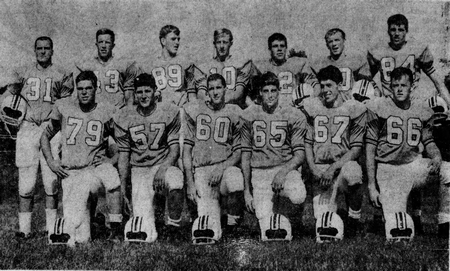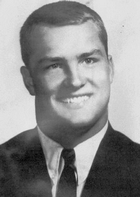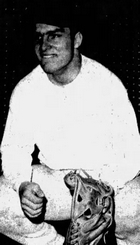Harmon Bove
| Date and Place of Birth: | March 13, 1950 Burlington, VT |
| Date and Place of Death: | March 4, 1970 Quang Nam Province, Vietnam |
| Baseball Experience: | Minor League |
| Position: | Catcher |
| Rank: | Corporal |
| Military Unit: | 2nd Platoon, E Company, 2nd Battalion, 5th Marines, 1st Marine Division USMC |
| Area Served: | Vietnam |
Harmon J. Bove, Jr., a friend, a man, and a great marine who
died fighting for America.
Gene R. Dark – The Brutality of War: A Memoir of Vietnam
Harmon J. Bove, Jr., was born on March 13, 1950 in Burlington, Vermont.
At 5-foot-10 and 195 pounds, he was a standout athlete at Burlington
High School, playing football as a linebacker on defense and as an
all-state fullback on offense. In baseball – also all-state - he was a
sensation behind the plate throwing out a succession of would-be base
stealers with his rifle arm. In 1968, he was named to the Vermont Shrine
football team for the 15th Annual Shrine Maple Sugar Bowl Game.
Bove turned down the opportunity to play football at Washburn University
(KS) to sign with the Houston Astros upon graduation in 1968. The Astros
sent the 18-year-old catcher to the Covington Astros of the Rookie Class
Appalachian League. Under the guidance of veteran Cuban manager Tony
Pacheco, and playing alongside future big leaguers Cesar Cedeno, Rich
Chiles, Bill Greif, Buddy Harris and Juan Jimenez, Bove appeared in 24
games and mustered six hits in 34 at-bats for a .176 batting average.
The summer of 1968 was to be Bove’s last on the professional ballfield.
The United States was in the midst of the Vietnam War and Bove enlisted
with the Marine Corps.
“At Camp Geiger [Jacksonville, NC), I met Harmon Bove,” recalled Alvin
Dark’s son, Gene Dark, in The Brutality of War: A Memoir of Vietnam. “I
had seen him at Parris Island a few times. He was the platoon guide for
Platoon 102, our sister company. He had the cocky tough-as-nails walk
and the stocky, muscular build to go along with his title of guide. Bove
was impressive looking. He was about five feet, eight inches or so and
two hundred pounds and looked like he could bench press twice his weight
or more. His shoulders were broad and his bulging neck muscles made it
difficult to determine where his neck ended and began.
“Because of Bove’s interest in sports, I told him who my father was. He
loved baseball, so the stories of growing up as Alvin dark’s son
fascinated him. We would talk about baseball for hours after the day of
training was done, and we eventually grew to be inseparable.
“One evening, I asked Bove why he had joined the Marines.
““Well, Dark,” he said, reflecting, “I did a very stupid thing. I had a
few strings pulled for me and went to sign up with the National Guard.
When I went to enlist, to become one of those ninety-day wonders, this
egotistical major in the Vermont Guard told me, ‘Cowards like you turn
my stomach. Young men are dying on the battlefield of Vietnam, fighting
for America, while you lie around taking it easy feeding off this great
land. Well, the idiot made me so mad that I joined the marines the next
day. He glanced at me with a big grin, ‘How’s that for being an
imbecile?””
When training was completed at Camp Geiger, Bove was given 30 days leave
to visit his family before reporting to Camp Pendleton, California.
During 20 days staging at Camp Pendleton, Bove and his fellow Marines
received shots, started on malaria pills, sat through first aid lectures
and generally prepared for life in Vietnam.
During this time, Gene Dark, was feeling pretty concerned about what he
was going to face in Vietnam and asked Bove how he felt he would cope.
“How do you think you are going to react when those gooks start shooting
at you, Bove? Do you think you will be brave or will you hide behind
anything you can find, shaking and scared out of your mind?”
“Brave?” Bove asked. “Nope, I’ll be scared to death I’m sure, but I’ll
do my job.”
It was at this time that Bove confessed his true fears. “The Nam is no
joke,” he said to Dark. “It’s the real deal. It’s blood and guts and
dying, man, and I ain’t going to make it back. I know I’m going to die
in that lousy stinking country. I can just feel it.
“I see myself blown to bits,” he continued, “lying in a rice paddy,
sweating and dying under the steamy hot sun of Vietnam. I can see it as
clear as day when I close my eyes, Dark.”
After Camp Pendleton, Bove flew to Okinawa, Japan and was assigned to E
Company, Second Battalion, Fifth Marines of the First Marine Division.
Gene Dark was assigned to F Company.
After arriving in Da Nang, Vietnam, Bove and Dark took a helicopter to
An Hoa to join their respective companies. “Do me a favor, you dumb
grunt,” Corporal Bove said to Dark, as they shook hands, perhaps, for
the last time. “Try to keep your rear-end in one piece. I don’t want to
have to go visit your mother.”
“Try to keep yourself together, too,” replied Dark. “I know how hard
that’s going to be for a stupid catcher.”
Bove’s Vietnam tour started July 4, 1969, and he served as an anti-tank
assaultman. After a month he contracted malaria during Operation Durham
Peak in the Que Son Montains. He was evacuated to a military hospital in
Da Nang for recuperation but was soon back in the frontline.
On March 3, 1970, while out on patrol in Quang Nam Province, Corporal
Bove stepped on a booby trap and suffered multiple fragmentation wounds.
He was flown to a hospital in Da Nang, where he died the following day.
He would have turned 20 in nine days.
“He was as strong as an ox, defiant, proud, tough, and so full of life,”
recalled Gene Dark. “Nothing could ever get him down. Every time I got
dejected, he had been there to cheer me up. Now he was gone.”
Harmon Bove is buried at Lakeview Cemetery, which is located alongside
Burlington High School’s baseball and football field. His headstone,
made by the stonemasons in Burlington, resembles a bench in the dugout,
with a baseball and glove etched into the stone.
In 1990, the Harmon Bove Memorial Scholarship was established by the
Vermont Sportswriters and Sportscasters Association.
The Bove family baseball spirit was kept alive by his older brother,
Perry Bove, who was the head baseball coach at St. Michael's College
(VT) from 1990 to 2005.
In March 2004, the following touching tribute was posted on the Vietnam
Veterans Memorial Fund Virtual Wall by retired US Navy Radioman Donald
Lytle:
I want to thank you Harmon Joseph Bove, Jr., for your courageous and
valiant service, faithful contribution, and your most holy sacrifice
given to this great country of ours!
Your Spirit is alive--and strong, therefore Marine, you shall never be
forgotten, nor has your death been in vain!
Again, although we never met personally, thank you Corporal Harmon J.
Bove, Jr., for a job well done!
It's Heroes like you, that made it possible for us to return and lead
full and free lives.
REST IN ETERNAL PEACE MY MARINE FRIEND

Harmon Bove (back row, first left) with the Burlington High School football team in 1967
Sources:
North Adams Transcript – March 9, 1970
Bennington Banner - March 12, 1970
Bennington Banner – May 24, 2008
The Brutality of War: A Memoir of Vietnam by Gene R. Dark (iUniverse,
2007)
Thanks to Astrid van Erp, for help with photos for this biography.
Date Added: May 19, 2013. Updated July 30, 2017
Can you add more information to this biography and help make it the best online resourse for this player? Contact us by email
Read Baseball's Greatest Sacrifice Through The Years - an online year-by-year account of military related deaths of ballplayers
Baseball's Greatest Sacrifice is associated with Baseball Almanac
Baseball's Greatest Sacrifice is proud to be sponsored by




